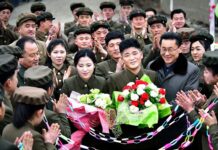 Image: Daily NK |
“I’ve once gone without food for a week,
but I want to ask Kim Jong Un if he’s ever felt hungry in his life”
This was the response of one young North
Korean defector to the question: What would you ask Kim Jong Un if you could
meet him?” posed by a young South Korean participant at a recent roundtable
discussion held to foster greater understanding and find more common
ground between young people from both Koreas. The discussion was held as part
of the Unification Pilgrimage initiative.
The program participants hailed from diverse backgrounds regardless of which side of the border they spent their formative years. However, the young defectors at the event reiterated to their
southern counterparts multiple times how “being born in South Korea is reason enough to
always be thankful.”
Other South Korean participants pushed for
more information on details about growing up in North Korea, which received responses illustrating a childhood wherein “it felt like our entire life was predetermined by our lineage (songbun, a caste system based on family
background and political loyalty).”
Also, as another young defector remarked, most people throw away the notion of dreams and aspirations because they are “so preoccupied with the
daily struggle of finding food to eat, it was impossible to think about the
future, much less the next day.”
For Lee Geum Joo (alias, 23), the
devastation and frustration he felt as a result of North Korea’s excessive
regional discrimination proved the most difficult burden to bear. “I saw
Pyongyang residents brightly laughing on KCNA broadcasts…they seemed to living
happily solely because they were residents of Pyongyang, which I thought was
wrong; that’s why I defected,” he explained.
Park Yong Ho (24), originally from North Korea, spoke to the cult of personality built around the Kim family and how it manifests in the education system. “North Korean
education in its entirety filters everything through the lens of the Kim Family and how we
needed to become workers for the Party” he asserted.
“These teachings were only held in
the morning and the remaining times was compulsory mobilization where we spent
time on the field and did manual labor.”
Since escaping from North Korea, the
consensus among those raised above the 38th parallel was that while planning out their
respective days, deciding what to do and when to do it, has come to be some the most
daunting, yet happiest, aspects of life upon resettling in South Korea.
Despite the
numerous stumbling blocks they have faced upon entering a starkly different society, “freedom and autonomy” were said to go a long way toward propping up these brave young escapees and encouraging them to “face these tribulations with a certain exhilaration.”
For North Korean defector Kim Myeong Hak (alias, 22), the most
amazing aspect of life in South Korea has been the ability to openly criticize
the nation’s president. “At first I was afraid that these people would be taken
away by something equivalent to North Korea’s State Security Department,” he
explained.
“North Korea’s concept of the ‘dignity of
the supreme leadership’ makes people there terrified to even talk about the
supreme leader, (and seeing South Koreans’ behavior) it was if I were in a whole
new world.”
Another common thread among the young
defectors emerged as the unequivocal feeling they had regarding the feeling that their
basic human rights were guaranteed here in South Korea.
“It was most shocking when I first found that
South Korea had so many fundamental rights,” current law student Choi So Young (alias, 24) said. “In North Korea, so
much suppressed (by the authorities); this realization infuriated me so much at
one point that I couldn’t sleep for three days.”
This awareness played a major role in her
decision to turn to pursue the study of law as a recourse. “North Korea
is not a place where a person can live with dignity as a human being; this was
a major reason I chose to study law (here in South Korea). I want to apply what
I learn to play a part in the betterment of North Korean society.”
 Image: Daily NK |

















